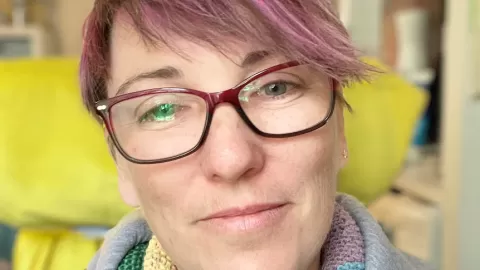
These days, Dani Croaker lives in Melbourne with her two kids and three dogs.
But growing up, she loved the space and freedom of living in the country. She mostly remembers it as a happy childhood — being out in nature and the wide-open paddocks with her sister and two brothers.
Yet when it came to things like school and friendships outside of her family, Dani always felt something wasn't quite right.
"I was too much. I got things wrong, like I didn't know how to temper my excitement or enthusiasm for things.
"I wasn't cool — I was never cool — I didn't know how to be popular. I didn't know the right things to do and say."
Reading social situations was a challenge for Ms Croaker — like who to play with at lunchtime.
"There are kids running around and they all seem to be interacting and playing with each other, and I wouldn't have the foggiest idea how to insert myself into that and then how to continue in whatever it is that they are doing."
Living in country Victoria through the '70s and '80s, the concept of "autism" or "being autistic" wasn't on the radar.
Ms Croaker says for her and others growing up around the same time, the 1988 film Rain Man, in which Dustin Hoffman plays an autistic person with savant syndrome, was the first popular representation of autism they had seen.
"Rain Man … is what I thought autism was," she says.
A changing understanding of autism
Over the past three decades, our cultural understanding of autism and what it means to be autistic has expanded far beyond those early stereotypes.
But much of the research into autism has focused on children and young people and how to "fix" autism, rather than how to support autistic people, Macquarie University research assistant Gabrielle Hall said.
She's the co-author of a recently published project called Hidden Histories, documenting the lives of late-diagnosed autistic adults.
"They are hidden histories because no-one really talks about it.
"So, first of all, [the project] was just about a history of the undiagnosed lives, and then it was around what has worked for these people and what hasn't worked, what has been the enablers of a good life and what has been hindering a good life."
Ms Hall is herself a late-diagnosed autistic adult and says having autistic researchers on the team added to the project's authenticity and made it easier to connect with the people being interviewed about their life stories.
Professor Liz Pellicano from Macquarie University's School of Education co-led the project and says a number of common themes became apparent as the team interviewed autistic adults and analysed the results.
One major theme was experiences of trauma.
"One woman described how she had been so affected by bullying that she [had] been an absolute wreck.
"Others talked about self-perception around always feeling different. Other people spoke of being ashamed for who they were.
"One of our participants very aptly put it: 'For 40 years I felt bad and different, but not able to put that into words.'"
Another theme that multiple people spoke to was a sense of regret or missed opportunity around being diagnosed later in life.
"It could have made school life, work, friendships so much easier if they had had a diagnosis," Professor Pellicano says.
"They could have had access to services and supports, and they could have potentially connected with others with shared experiences of being autistic much earlier than they have done now."
But while there were negative experiences in the lives of many of those interviewed, Ms Hall says their resilience also shone through.
"I saw such resilience and strength and so many gifts and skills that it made me feel really proud to be a part of that community."
Dani's diagnosis
Ms Croaker was one of the autistic people interviewed for the Hidden Histories project.
She says as she became an adult, the pressures of trying to behave the way people expected and follow social norms led her to a dark place in her adult life.
"I didn't know who I was or what I actually wanted and I second-guessed everything I thought. So it was a pretty miserable place to be."
But then came a revelation.
The child of one of Ms Croaker's close friends was diagnosed with autism, which led her to discover how autism presents differently in women and girls. Suddenly things made sense.
She says the eventual diagnosis she received was "the best thing that has ever happened to me".
"I was 46 at the time, so I had been trying for a very long time to fix myself, to absolutely no success, but just completely losing myself along the way.
"So it was just starting that process of dropping all of these 'shoulds' that I had around who I was supposed to be and actually rediscovering who I was, which I hadn't known since I was a kid I don't think."
Improving lives
Ms Hall says understanding the lives of autistic adults is critical, especially when their health outcomes can be worse.
Autistic people experience higher levels of chronic and acute illness compared to the general population.
"It's really important to consider that as we understand autistic people across their life spans, preventative measures to scan or to look at how we can capture physical illness earlier [can] prevent more discomfort later," she says.
"Those things take a very long time, but it's really about knowing that that's a priority and funding that to make change as soon as possible.
"Because autistic people are ageing, and autistic people age differently and require different services and supports."
from https://www.abc.net.au/news/health/2022-01-25/autism-adults-hidden-hist…